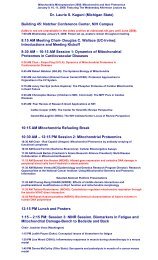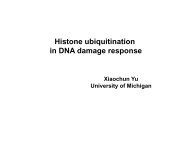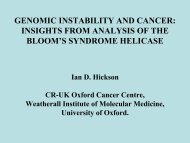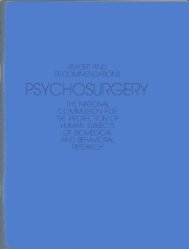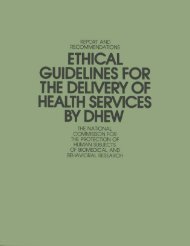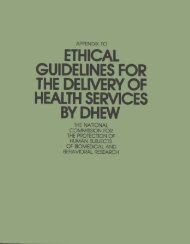RESEARCH ON THE FETUS - National Institutes of Health
RESEARCH ON THE FETUS - National Institutes of Health
RESEARCH ON THE FETUS - National Institutes of Health
Create successful ePaper yourself
Turn your PDF publications into a flip-book with our unique Google optimized e-Paper software.
In making such an argument, I invoke a principle that I call the "principle<br />
<strong>of</strong> proximity": namely, that research is ethically more acceptable the<br />
more closely it approximates what the considered interests <strong>of</strong> the subject would<br />
reasonably be. For example, Hans Jonas has argued that dying subjects should<br />
not be used in nontherapeutic research, even when they have consented, unless<br />
the research deals directly with the cause from which they are dying; that is,<br />
it is presumed that a dying subject has an interest in his/her own disease which<br />
legitimates research on that disease where research in general would not be<br />
legitimate.<br />
Such a principle is, <strong>of</strong> course, open to wide interpretation. But I think<br />
it not unreasonable to suggest that the dying fetus would have an interest in<br />
the cause <strong>of</strong> its dying or in the development <strong>of</strong> technology which would allow<br />
others like it to survive. On such a principle, one might argue that it is more<br />
ethically acceptable to use dying fetuses with Tay-Sachs disease as subjects in<br />
nontherapeutic research on Tay-Sachs disease than in nontherapeutic research on<br />
general fetal pharmacology. Similarly, one might argue that it is ethically<br />
acceptable to use nonviable fetuses ex utero as subjects in nontherapeutic<br />
research on the development <strong>of</strong> an artificial placenta. The development <strong>of</strong> a<br />
full rationale for such a position would require an analysis along the lines<br />
suggested by McCormick and Toulmin, and I cannot attempt that here. At this<br />
point I simply wish to suggest that I believe it is possible to argue for both<br />
therapeutic and nontherapeutic research directed toward the development <strong>of</strong> an<br />
artificial placenta.<br />
5. Finally, members <strong>of</strong> the Commission disagreed about changes in the<br />
timing or method <strong>of</strong> abortion in relation to research. Recommendation (10) States<br />
clearly that the recommendations <strong>of</strong> a physician regarding timing and method <strong>of</strong><br />
abortion should not be determined by the design or conduct <strong>of</strong> nontherapeutic<br />
research. I am in full agreement with this Recommendation.<br />
The provision in Recommendation (6) (item g), however, is more ambiguous.<br />
I would argue that changes in timing or method <strong>of</strong> abortion are ethically acceptable<br />
provided that they are freely chosen by the woman and that she has been fully<br />
informed <strong>of</strong> all possible risks from such changes. I base this argument on the<br />
right <strong>of</strong> any patient to be informed about alternative courses <strong>of</strong> treatment and<br />
87



